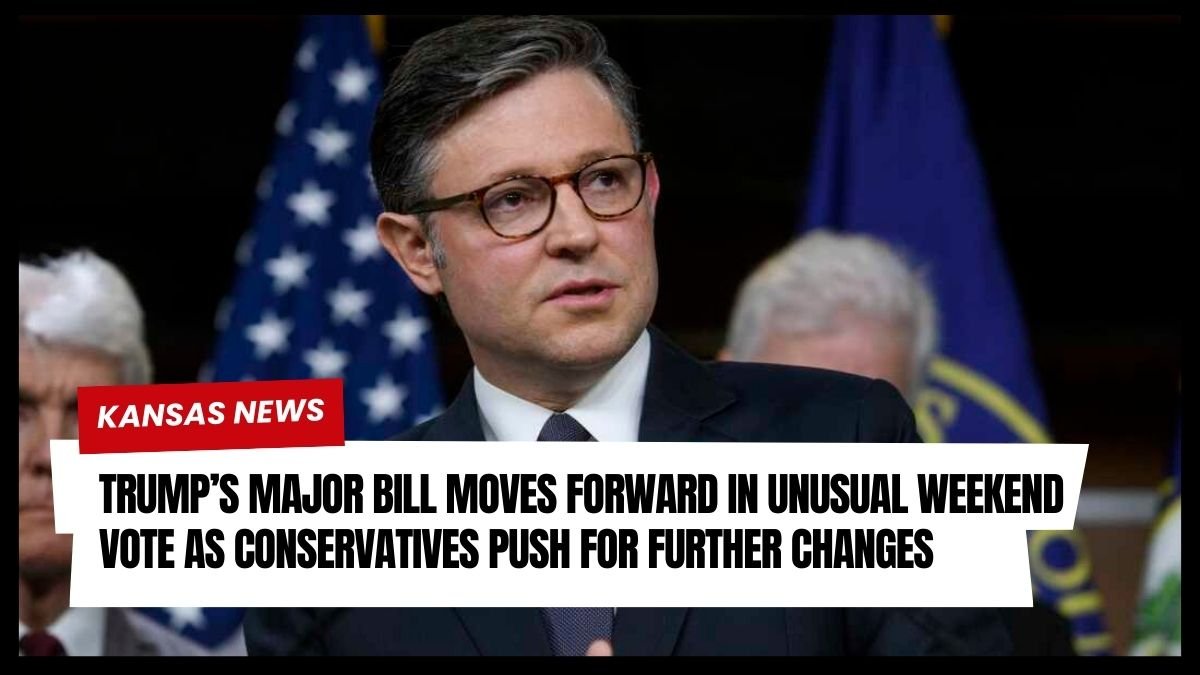In a rare Sunday night session, House Republicans narrowly moved President Donald Trump’s expansive tax cut proposal forward from the Budget Committee.
Despite the bill advancing, internal resistance remains strong. The vote passed 17-16, with four conservative Republicans abstaining by voting “present,” a strategic move allowing the package to progress.
GOP Divisions Over Spending and Medicaid Work Requirements
The conservative bloc, notably members of the House Freedom Caucus, are demanding faster implementation of Medicaid work requirements and more aggressive reductions in green energy funding before committing their full support.
Speaker Mike Johnson, who convened with fellow Republicans shortly before the vote, acknowledged that “several details still need ironing out.” While expressing optimism, he refrained from divulging specifics.
“We can and must do better before we pass the final product,” said Rep. Chip Roy (R-TX) following the vote.
Republican Concerns: Front-Loaded Tax Cuts, Delayed Offsets
Critics within the GOP argue the bill’s structure is imbalanced. They say tax cuts and spending are prioritized upfront, while the measures meant to offset these costs are delayed, particularly regarding work requirements for able-bodied Medicaid recipients.
Under the current draft, these work rules wouldn’t take effect until 2029, a timeline that many conservatives find too slow. Speaker Johnson confirmed he wants to accelerate implementation, but acknowledged the administrative delays at the state level.
Features of the Proposed Tax Bill
| Feature | Details |
|---|---|
| Tax Cuts | Permanently extends 2017 income tax cuts |
| New Exemptions Proposed | No taxes on tips, overtime pay, auto loan interest |
| Medicaid Work Requirements | Proposed start: 2029 (conservatives want earlier implementation) |
| Spending Areas | Border security, deportations, defense |
| Green Energy Cuts | Republicans seek deeper reductions |
| SALT Deduction Cap Proposal | From $10,000 to $30,000 (or $124,000 per New York proposal) |
| Projected Debt Impact (10 years) | Estimated $3.3 trillion added to the national debt |
Democratic Opposition and Public Criticism
Democratic lawmakers have strongly condemned the bill. Rep. Jim Clyburn (D-SC) voiced concerns on CNN, stating:
“Balancing the budget should not come at the expense of working-class Americans.”
Democrats particularly object to cuts to Medicaid and food assistance, viewing them as punitive toward vulnerable communities.
Previous GOP Committee Failure and Present Abstentions
Just days before, the bill failed to pass the Budget Committee due to the same conservative holdouts. On Sunday, Reps. Roy, Norman, Brecheen, and Clyde allowed the vote to pass by not opposing it directly — instead, they opted to vote “present.”
Rep. Ralph Norman (R-SC) cited the recent U.S. credit rating downgrade as a motivator for pushing harder on budget cuts:
“We’re excited about what we did. We want to move the bill forward. But we’ve got a lot more work to do.”
SALT Deduction Demands from Centrists
Republican centrists, especially from high-tax states like New York, are pushing to dramatically raise the cap on state and local tax (SALT) deductions. Current proposals aim to increase the cap to:
- $62,000 for single filers
- $124,000 for joint filers
Rep. Nick LaLota (R-NY) and others argue that this expansion is essential to maintain support from their constituencies.
Senate Challenges May Complicate House Unity
Even if the bill clears the House by the Memorial Day target, it faces further scrutiny in the Senate, where Republican senators are expected to propose additional amendments — changes that could make it harder for House leadership to maintain consensus.
Rep. Jodey Arrington (R-TX), Chair of the Budget Committee, emphasized that negotiations are ongoing and fluid:
“Deliberations will continue through the week — likely right up until the moment we put this big, beautiful bill on the floor.”
The GOP’s push to pass Trump’s tax plan faces significant obstacles, not just from Democrats, but also from within its own ranks. As the Memorial Day deadline looms, internal negotiations around Medicaid, SALT deductions, and green energy cuts are proving pivotal.
With a narrow majority and various factions demanding changes, Speaker Mike Johnson must strike a delicate balance to get the bill through the House and ready for the Senate showdown.




